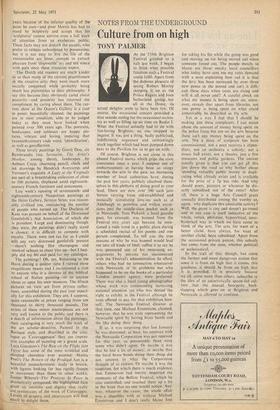NOTES FROM THE UNDERGROUND
Culture from on high
TONY PALMER
Of course, Brighton is not alone in this absurd Festival mania which grips the civic conscience once a year. I suppose out of embarrassment at having been so stingy towards the arts in the past, an increasing number of local authorities have, during the past few years, publicly absolved them- selves in this plethora of doing good to your Soul. There arc now over 500 such jam- borees varying from old-established and musically stimulating love-ins such as at Aldeburgh to pointless and witless excur- sions into the middle-class pocket such as at Newcastle. Toni Pickard, a local geordie poet, for example, was banned from the Festival two years ago because he men- tioned
a rude word in a public place during a scheduled recital of his poems and one person complained. To tell you the true reasons of why he was banned would lead me into all kinds of libel; suffice it to say he was pressured out of his remaining en- gagements by persons not unconnected with the Festival's administration. In effect, others who had no connection whatsoever with Newcastle or its problems but who happened to be on the books of a particular London concert agency, were preferred. There was also a local young photographer whose work was commanding increasing national attention yet who was denied the right to exhibit in the Festival although he even offered to pay for that exhibition him- self. The Newcastle Festival director at that time, one Michael Emmerson, claimed, however, that he was truly representing the Newcastle spirit by having brass bands and the like doing their thing.
If so, it was surprising that last January he was dismissed; at least, his contract with the Newcastle Corporation was not renewed for this year, so presumably there were some who didn't agree. Or maybe it was that he lost a lot of money; or maybe that the local brass bands doing their thing did not amount to what the Corporation thought of as culture. Or maybe it was the suspicion, for which there is much evidence, that Emmerson had merely imported the remnants of the Belfast Festival, which he also controlled, and touched them up a bit in the hope that no one would notice. Any- way, whatever the cause, the whole affair was a shambles with or without Michael Emmerson and I don't really blame him
for taking his fee while the going was good and moving on (or being moved on) when someone found out. The people mostly to blame are those sneaky local councillors who today have sent me my rates demand with a note explaining how sad it is that the levy has been increased by over three new pence in the pound and isn't it diffi- cult these days when costs are rising and will it all never end? A careful check on what my money is being spent on, more- over, reveals that apart from libraries, not one penny is being spent on what could conceivably be described as the arts.
Yet in a way I feel that I should be making just these complaints. I can moan about the amount of money being spent on the police force but not on the arts because there isn't any money being spent on the arts, Not a piece of sculpture has been commissioned, not a poet receives a stipen- diary, not an orchestra a subsidy; not a music hall exists, not a theatre, just a few museums and public gardens. The answer usually given is that you can get pit this just down the road so why bother about spending valuable public money in dupli- cating what already exists and is available for the price of a 2p bus ride. And why should poets, painters or whatever be dir- ectly subsidised out of the rates? After all, there is a huge Arts Council grant annually distributed among the worthy so, again, why duplicate this admirable activity? Well, the grant is tiny and doesn't go round and in any case is itself indicative of the whole, rotten, philistine, hypocritical, semi- hysterical way in which we have come to think of the arts. The arts, for want of a better cliché, have always, for want of another cliché, been subsidised. Apart from the occasional private patron, this subsidy has come from the state, whether political or ecclesiastical.
In the trail of this, though, has come the further and more dangerous notion that since it is from on high that it comes, this goodness, it should be from on high that it is provided. It is precisely because we all, some more than others, subscribe to the idea of an autocratically spoon-fed cul- ture that the mutual bourgeois back- slapping which goes on at Brighton and Newcastle is allowed to continue.


































 Previous page
Previous page